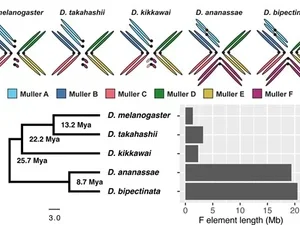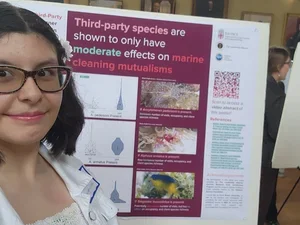Biology: Related Content

Work propels students toward promising careers in bioinformatics and genetics.

Bennington College student Andrea Lara ’26 joins Brown University ecology research.

Yasmine Fundi ’25 studies Biology and Dance at Bennington. She reflected upon her Field Work Term at Southwestern Vermont Medical Center, a member of Dartmouth Health, in Bennington, VT, and shared her plans for after graduation.

Each winter, Bennington College students step outside the classroom to take part in Field Work Term—a six-week immersion in the professional world designed to help them deepen their studies, gain real-world experience, and explore potential career paths and contribute valuable skills to companies and nonprofits.

On Saturday, April 12, 2025, Tusti ’25, who is focusing on biology and film at Bennington College, stood among a sea of scientific posters and passionate young researchers at Brown University’s Engineering Research Center. She was there as one of approximately 200 undergraduates selected from across the country to present at Brown’s inaugural National Undergraduate Research Conference, a first-of-its-kind student-run event designed to spotlight undergraduate work in medicine, biomedical research, and public health. It was organized by the Ivy League+ Pre Health Society.

Catherine Hamilton MFA ’01 is an accomplished artist, educator, and lifelong bird enthusiast. Her work has graced the pages of prominent publications like Nature and Orion Magazine, and she has exhibited her fine art both nationally and internationally.

Tusti '25 studies Biology and Film and Video at Bennington. She reflected upon her advanced work and accolades and shared her plans for after graduation.

Shlesha Pradhan '24, from Kathmandu, Nepal, has always been interested in science, particularly in Biology. While in high school, her initial plan was to enter the field of medicine; however, her perspective shifted when she took a volunteer role at a rehabilitation center.

During the last few days of the fall term, Jupiter Kalinowski ’23, who studied protein biochemistry and biological research methods at Bennington, was busy in the lab. They were running the final experiment of their senior work.

Three students presented their research experiences working with Drosophila: the common fruit fly. As varied as their research was, each agreed that fruit flies are a great model organism. Each exemplified the perseverance required in scientific research, and all would encourage students to apply for research experiences.

The data Olivia Chiossone ’23 gathered during a “Research Experience for Undergraduates” program at Eastern Kentucky University propelled her senior work.

Bennington College faculty are encouraged to follow their own interests and the interests of their students as they propose their classes. As a result, classes, as many as half of which are new each term, feature topics that are always reflecting new lines of inquiry.

William Huntley ’23 shares his journey researching leaf morphology at Harvard, his passion for molecular and plant biology, and how his Bennington education helped shape his vision for higher education.
By Halley Le '25

How does the fat distribution and aging process in fruit flies illuminate how the human body functions? Tom Evans ’24 dove into this question at a pathology research lab in the University of Washington (UW) during the Summer 2022 Field Work Term (FWT).
By Halley Le '25

How can parents of infants notice the early markers for autism? Can early identification lead to better care down the road?
By Halley Le '25

Similar to how many artists describe their work as a calling, Dr. Robert Davis, MD, MPH ’79 always felt drawn to a career in public health.

Carlos Mendez-Dorantes ’15 was one of 60 students nationwide to be awarded a Ford Foundation Predoctoral Fellowship by the National Academies of Sciences, Engineering and Medicine.

A Simulation Model of Plants in a Heterogeneous World
Thesis by Mieke Vrijmoet '16

Bennington College biology faculty member Betsy Sherman took 14 students to the Cayman Islands for Field Work Term, in conjunction with her class Field Course in Coral Reef Biology. Students became certified scuba divers and gained first-hand experience studying coral reef fish biodiversity, collecting valuable data to be used for research studies and governmental policy.

Bennington College Faculty member Betsy Sherman has a paper in the award-winning biological and medical sciences journal, PeerJ. Her research examines sea urchins’ tolerance for increases in ocean temperature.

More than 80 Bennington students and staff members spent a recent Saturday pitching in around town and continuing the College's Hurricane Sandy relief efforts as part of the Bennington ACTS annual day of service.

In the current issue of Northern Woodlands, biology faculty member Betsy Sherman discusses a recent study she conducted with alumna Katie Van Munster ’08 on red-spotted newts in Vermont.

The New York Academy of Sciences has awarded Dr. Jason Fridley ’97 a 2012 Blavatnik Award for Young Scientists in support of his research on the impact of climate change and invasive species on terrestrial ecological communities.

Biology faculty member Amie McClellan has been awarded a $237,000 grant from the National Institutes of Health (NIH) to support her continued research on a cellular protein that may have therapeutic implications for various types of cancer.

In celebration of the 200th anniversary of Charles Darwin's birth, biology faculty member Elizabeth Sherman will lecture on Why Darwin Matters at the Northshire Bookstore in Manchester, Vermont on Friday, March 27, at 7 pm. This event is free and open to the public.

Sara Bebus is a conservation and animal behavioral biologist with broad interest in both basic research and applied conservation and animal welfare.

Amie McClellan is a cell biologist who utilizes baker’s yeast with a very serious goal in mind: to explore how “molecular chaperones” participate in helping proteins attain and maintain their structure and function, and how this relates to human diseases that arise when this process goes awry.

Linda MacKechnie works with Biology and Chemistry faculty and staff in the Dickinson Science Building to support students with their independent research project needs.

